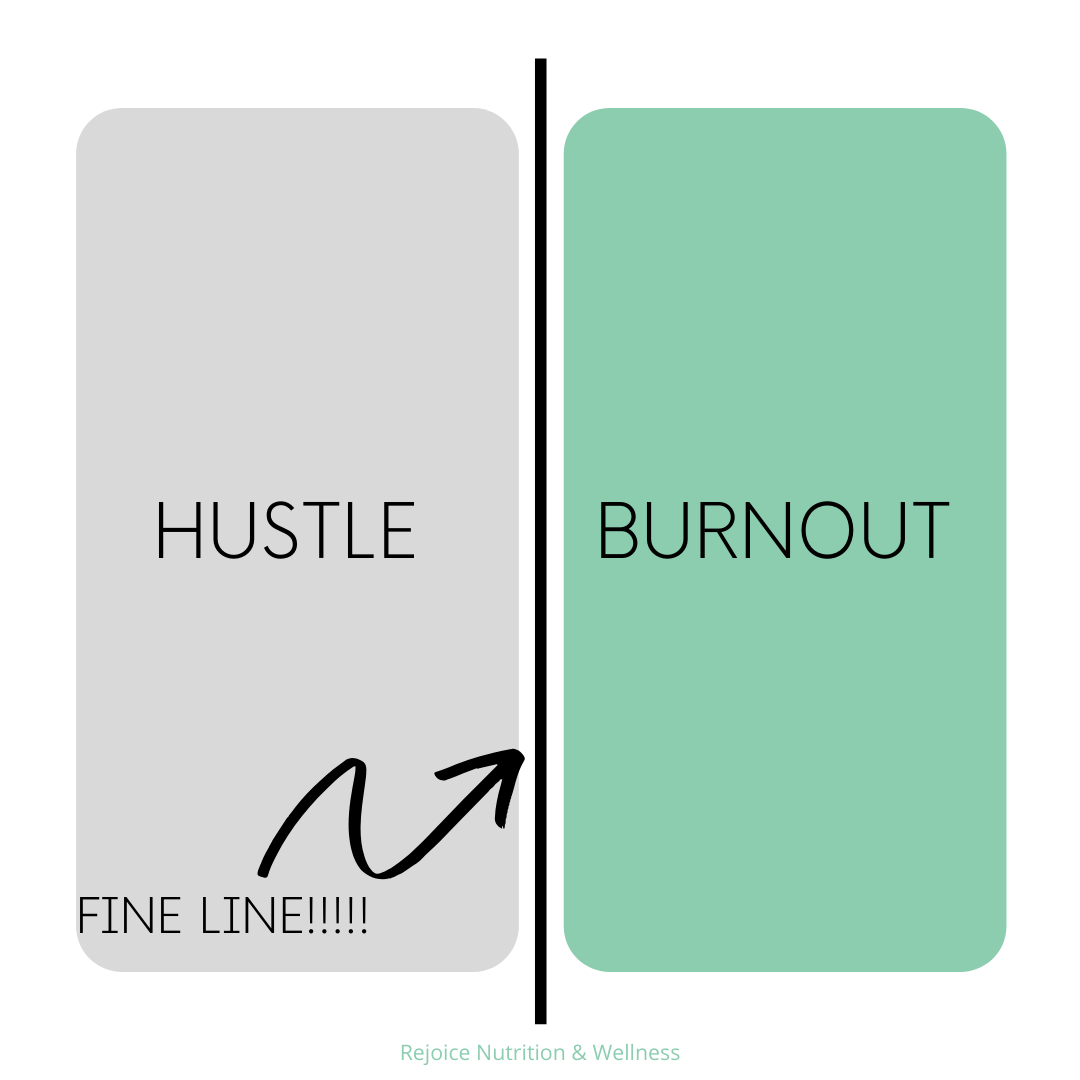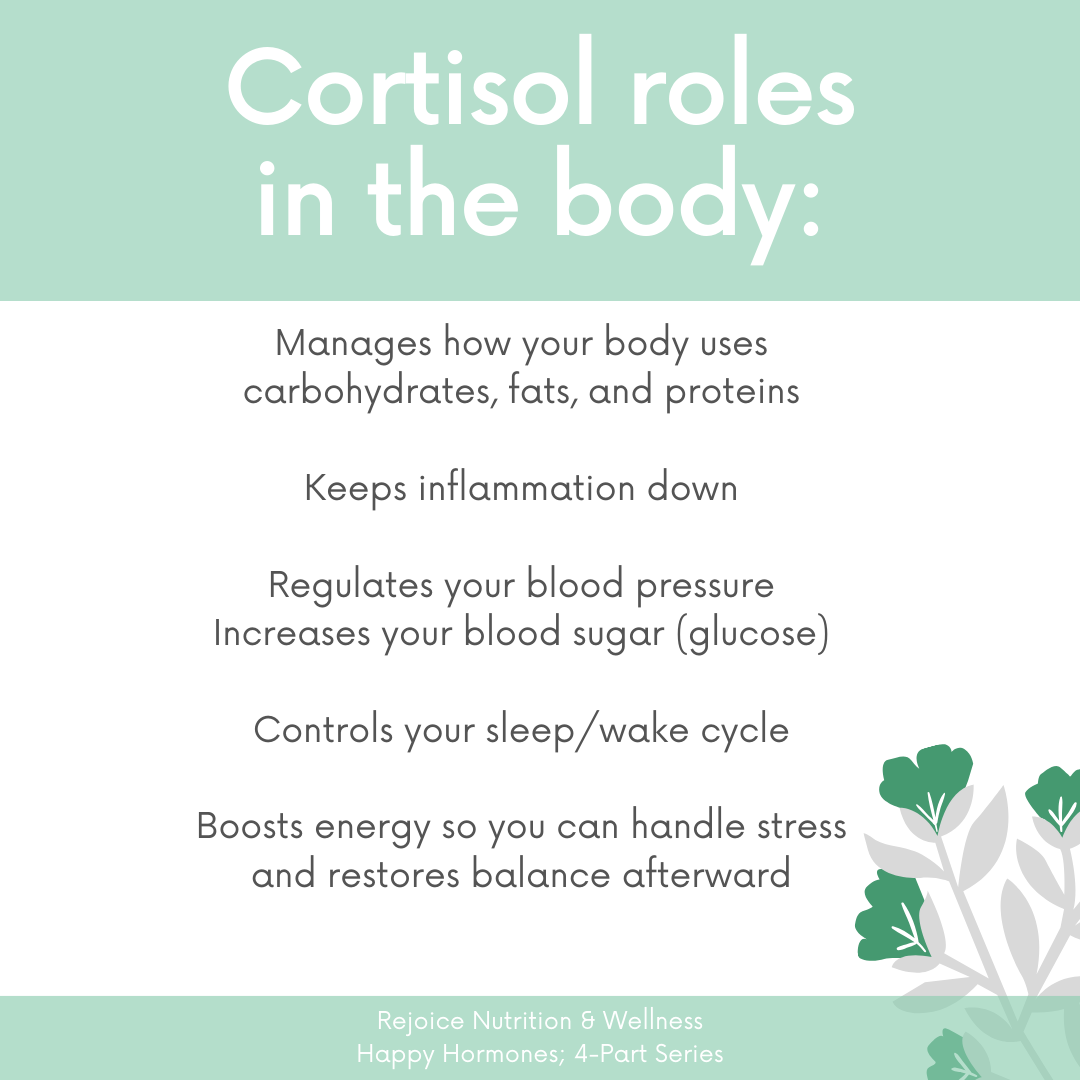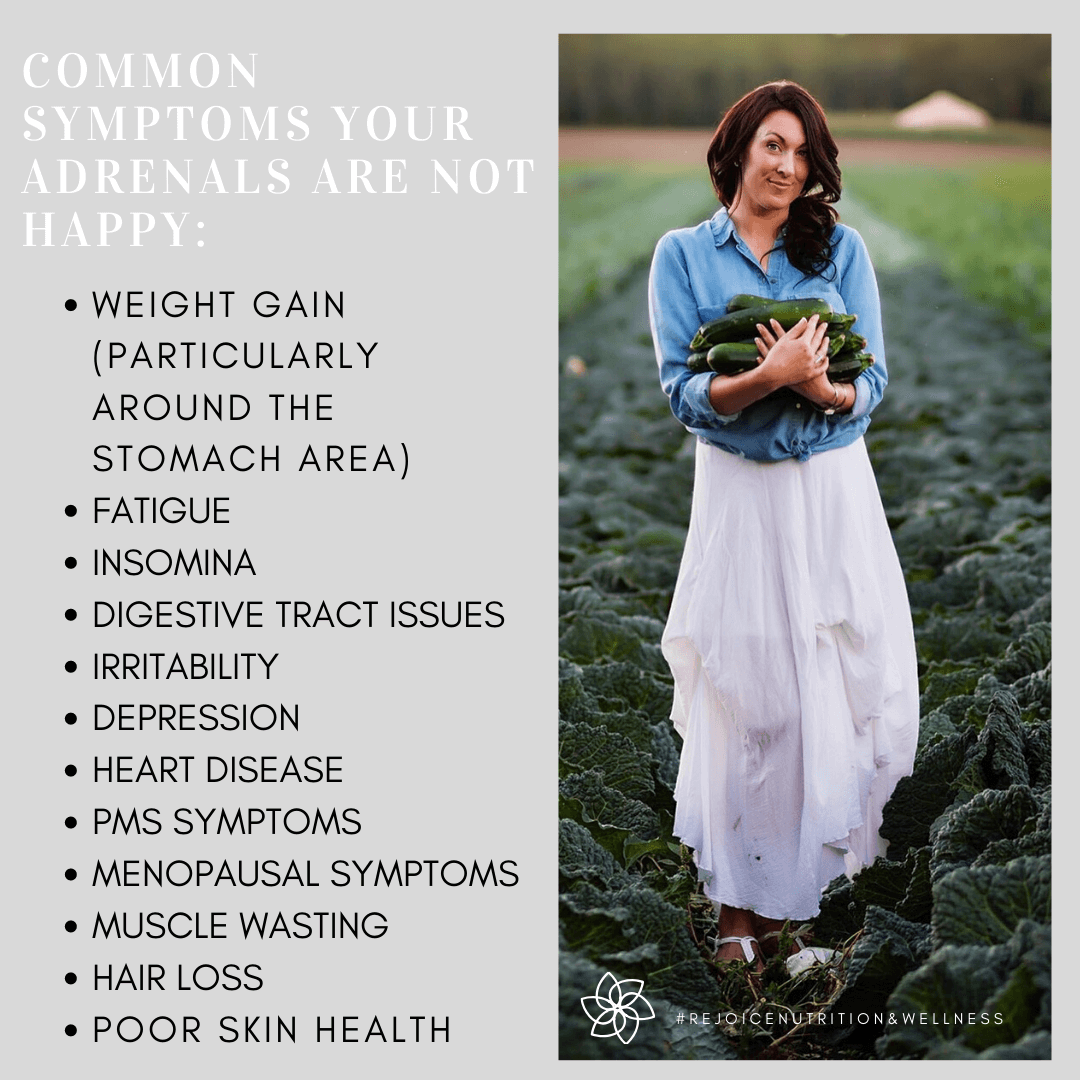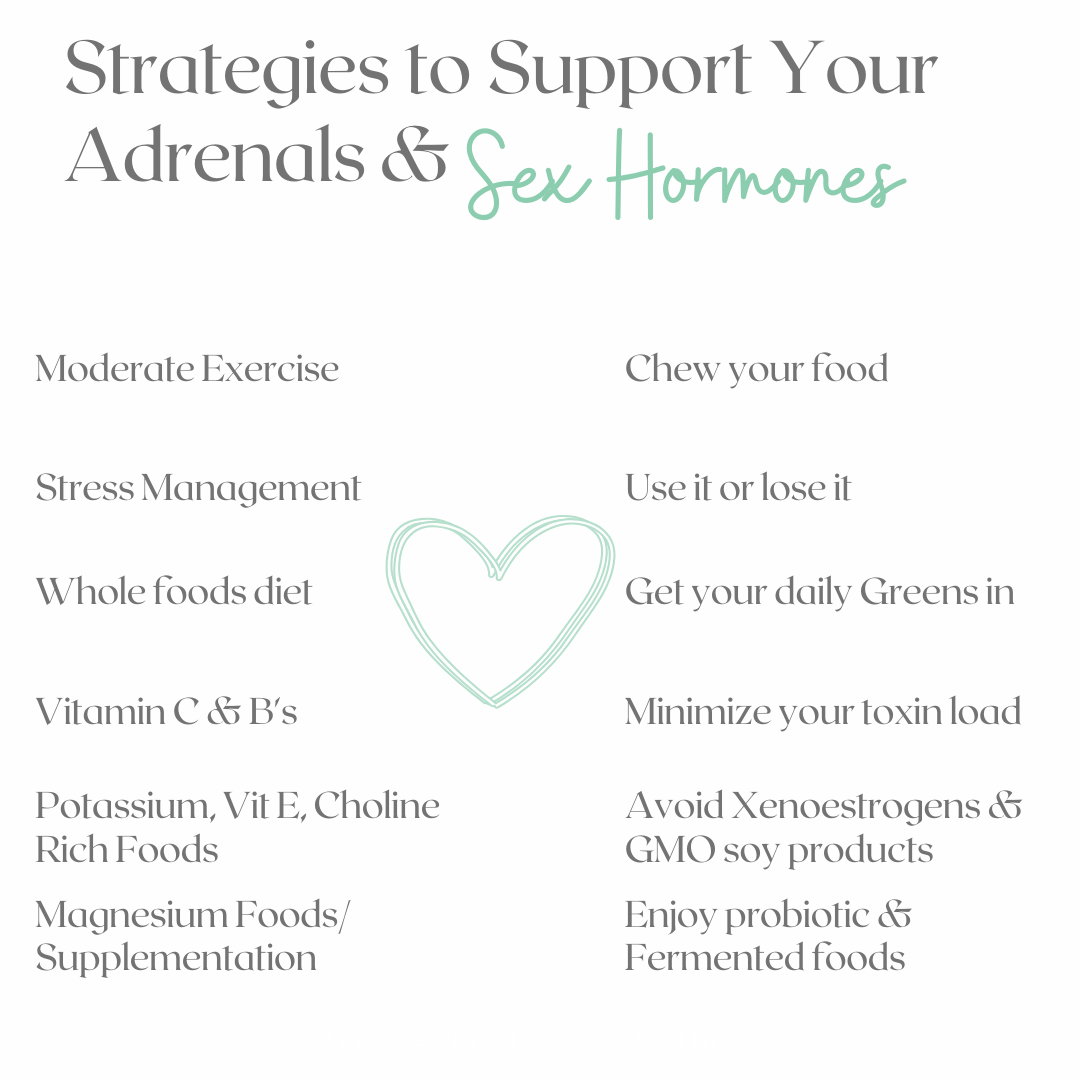Part Two of our Happy Hormone Series
Last week in Series One it was all about developing an understanding of our Hormone Basics. We discussed:
- What Systems do Hormones Regulate in the body?
- What are the key players in the Hormone system?
- What are some of the root Causes of Hormonal Imbalances?
- What are some common symptoms of hormonal imbalances?
- How to make a Hormone Loving Salad? (you knew I was gonna toss in some food)
- Plus, a 7 Hormone Loving Salad Recipe Ebook FREE!!!
If you missed the blog post last week from series one, you can snag it here before we move on. If you are all following along then great let’s dive into Series Two, Stress, Adrenals, & Sex Hormones! In Series Two, we are discussing:
What happens in our body when it’s under stress?
The difference between Healthy vs. Unhealthy Stress?
Cortisol & it’s long-term impacts on your hormone health
Too Much Vs. Too Little Cortisol
The Adrenals, Stress, & Strategies
Sex Hormones, Vitality & Healthy Habits
1) What happens in our body when it’s under stress?
Physiologically our body is responding in the same way, whether you are being chased by a bear, stuck in traffic or stressing about a deadline you created for yourself. The flight or fight response in the body is the same.
Think of when you begin to feel stress or anxiety building within the body, your face might get flushed, we feel hot and sweaty this is known as a psychogenic fever= the body temperature gets elevated, glucose is released to the muscles, norepinephrine, and cortisol is being released to deal with that perceived stressful event.
Now when this happens, our immune system is suppressed, our digestive system shuts down to conserve energy so we can either run away or attack. This fight or flight response in the body is short-term, contained, and needed for our survival.
But today, the stress that people are trying to cope with is this long-term, chronic, nagging persistent stress from school, work, family, or financial stressors that are triggering BUT we CAN’T always run away from them.
2) What is the difference between Healthy Stress & Unhealthy Stress?
I first feel it is important not to vilify stress as not all stress is bad stress. There is the most amazing TEDTALK about how not all stress is bad for the body that truly changes my outcome on stress and how I mentally respond when I feel it brewing inside me. It is so worth a listen, you can check it out here on Youtube.
Healthy stress can foster performance, resiliency, toughness, and motivate us to achieve our goals and push ahead to make our dreams a reality.
Unhealthy stress can inhibit us, defeat us and break us down both physically & mentally
Now, what determines if stress is healthy or harmful is often based on how we appraise the stress, so on the healthy side, we might view the situation as a challenge where our resources and/or capacity exceeds those demands being put upon us. Vs. unhealthy stress where we might view the situation as a threat where we see the demands exceeds the resources or capacity/energy that we have at that moment in time.
Factors that may sway how we appraise the stress can be as simple as how much sleep we had the night before, what else is going on in our life that day, nutritional deficiencies, our mood, and hormone. So many lifestyle factors can impact how we perceive stress which can be altered day by day which is why taking a holistic approach to balancing hormones (body & mind) is key.
3) Cortisol & it’s long-term impacts on your hormone health?
Cortisol is often called the “stress hormone” because of its connection to the stress response, however, cortisol is much more than just a hormone released during stress. Understanding cortisol and its effect on the body will help you balance your hormones and achieve good health.
Cortisol is one of the steroid hormones and is made in the adrenal glands. Most cells within the body have cortisol receptors. The secretion of the hormone is controlled by the hypothalamus, the pituitary gland, and the adrenal gland, combination glands often referred to as the HPA axis.
Because most bodily cells have cortisol receptors, it affects many different functions in the body. Cortisol can help control blood sugar levels, regulate metabolism, help reduce inflammation, and assist with memory formulation. It has a controlling effect on salt and water balance and helps control blood pressure. In women, cortisol also supports the developing fetus during pregnancy. All of these functions make cortisol a crucial hormone to protect overall health and well-being.
- Manages how your body uses carbohydrates, fats, and proteins
- Keeps inflammation down
- Regulates your blood pressure
- Increases your blood sugar (glucose)
- Controls your sleep/wake cycle
- Boosts energy so you can handle stress and restores balance afterward
So, cortisol is our body’s stress hormone when we are experiencing this constant daily stress that cortisol release is like a slow leaking faucet in the body which over time increases inflammation which is linked to heart disease, obesity, and mental health diagnoses such as depression & anxiety.
Learning how to cope with that low-grade daily stress and how WE can turn that leaky faucet off ourselves within the body is crucial to managing stress, anxiety, and our overall longevity. This is why I want to provide you with knowledge, resources, and tools in the 4-Part Healthy Hormone Series to give you what you need to turn off that faucet.
4) Too much vs. Too Little Cortisol
Before reading this you might have thought of Cortisol as “the bad guy” because it’s associated often with just bad stress. I hope after reading it’s other vital functions in the body you see that Cortisol is essential to keep balanced. When cortisol is balanced so are our other organs and systems in the body that regulate hormones and metabolism. Our desired outcome is to keep our “Cortisol in Check”, aka balanced NOT too much or too little.
TOO Much Cortisol/ long-term secretion of your stress hormone can derail your body’s most important functions. It can also lead to several health problems, including:
- Anxiety and depression
- Headaches
- Heart disease
- Memory and concentration problems
- Problems with digestion
- Trouble sleeping
- Weight gain
- Skin that bruises easily
- Cushing syndrome
- Muscle weakness
- Diabetes
Too Little Cortisol is your body doesn’t make enough of this hormone, you have a condition doctors call Addison’s disease. Usually, the symptoms appear over time. They include:
- Changes in your skin, like darkening on scars and in skin folds
- Being tired all the time
- Muscle weakness that grows worse
- Diarrhea, nausea, and vomiting
- Loss of appetite and weight
- Low blood pressure
5) The Adrenals, Stress, & Strategies
The hormones produced by the two adrenal glands include adrenaline and noradrenaline, cortisol, aldosterone, testosterone, DHEA, estrogen, and progesterone. Sixty steroids are also produced by the adrenals from cholesterol. So.. your Adrenals are a BIG DEAL guys.
Adrenal hormone production adjusts in response to our stress response whether physical, emotional, or psychological. which affect cravings, sleep patterns, energy, metabolism. When our Adrenals are underactive, there are two big factors linked:
- Underactive Adrenals Spell STRESS!!!
- Underactive Digestive Functions (gas, bloating, poor absorption, constipation, digestive conditions)
Constant fluctuations of adrenal hormones result in exhaustion of the glands and can result in the following symptoms:
- weight gain (particularly around the stomach area)
- fatigue
- insomnia
- digestive tract upsets
- irritability
- depression
- heart disease
- PMS symptoms
- Menopausal syndromes
- muscle wasting
- hair loss
- poor skin health
STRATEGIES TO SUPPORT YOUR ADRENALS INCLUDE:
- Moderate physical exercise
- Stress management (counseling, meditation, yoga, walking, reading, etc)
- A wholesome diet of whole foods
- Vitamin B-Rich Foods (Vitamin B complex supplementation is also useful short-term/ when stress is high)
- Supplementation of plant-based Vitamin C including pantothenic acid
- Consume foods high in potassium
- Vitamin E foods
- Choline rich foods
- Magnesium-rich foods and supplementation in liquid or powder form at bedtime for oxidative phosphorylation and energy production (quickly used under stress).
- Supporting digestive functioning by CHEWING your food, consuming predigested foods (smoothies, green juice, bone broth), and fermented foods (water kefir recipe, milk kefir, kombucha, Saurekrut). Here is my how-to-make sauerkraut recipe
- Probiotics can be important to get digestive functions back on track! Check out my blog post all about how to incorporate them here
Where to begin with all of these recommendations? Don’t worry I got you covered in the Series 2 Freebies!!!!!
- 10 recipes designed to support the stress, adrenal glands, and sex hormones in the body! 10 recipes packed with all the nutrients listed above! This is sent out to my list serve this Friday (be sure to sign-up on the home page).
- 15% off your favorite supplement brands though the FullScript Dispensary. As a registered health practitioner with them, I get a great deal and I would be happy to set you up and can email you your recommendation on top supplements needed to support this area. Just send me an email to jo@rejoicenutritionwellness.ca or send a note to me through the contact page and I can get you set up.
5) Sex Hormones, Vitality, & Healthy Habits
The hormones that have been regulating your reproductive cycle, sex drive, mood, and more are ebbing, and very often these low levels have a negative effect on your sex life and overall vitality. Reduced levels of estrogen, testosterone, and other hormones are thought to be a primary cause of age-related sexual dysfunction, rapid aging, and sluggish… well everything.
Different hormones control a wide array of essential body functions, including energy level, growth and development, and reproduction.
- Estrogen. Estrogen is the primary female hormone, and it helps regulate the menstrual cycle, control the development of female sex organs, and thicken the lining of the uterus to support pregnancy. As a woman approaches menopause — the period known as perimenopause, levels of estrogen begin to decrease dramatically. When estrogen levels become so low that the uterine lining no longer thickens, menopause occurs. Low levels of estrogen can have a big impact on your sex drive, cause unstable mood, and broken sleep patterns.
- Testosterone. Testosterone, which is primarily thought of as a male hormone, is also made by, and is important too, women. A woman’s ovaries naturally produce testosterone, which is used to help make estrogen. Some studies have shown that higher levels of testosterone are associated with increased sexual desire and sexual behavior in women.
- Progesterone. Like estrogen, progesterone is another hormone that helps control the menstrual cycle and support pregnancy. Levels of progesterone also decline with age.
8 Strategies to Support your Sex Hormones:
Resistance Training
A balanced Plate of fat, protein & carbs (extreme dieting & overeating can disrupt sex hormones)
Minimize Stress & Cortisol levels
Get some SAFE sun & take vitamin D supplements
Supplement in Vitamin B, C, and Magnesium
Get lots of rest and a good night sleep
Reduce your Toxic (chemicals in food, household cleaners, & beauty products)
Be mindful of estrogen-like compounds (GMO soy, chemicals in make-up, hormones in conventional meat, etc)
I hope this information has been useful to help you manage stress while supporting your Adrenals & Sex Hormones.










